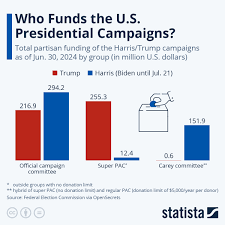How Political Campaigns Are Funded in the USA
Political campaigns in the USA rely heavily on funding to spread their messages, rally supporters, and compete in elections. Funding plays a key role in making sure candidates can get their message out to the public through advertisements, events, and other forms of outreach. Let’s dive into the various ways political campaigns are funded in the United States, keeping it simple and straightforward.
Individual Donations: The Power of the People
One of the biggest sources of campaign funding comes from individual donations. Ordinary citizens can donate money to support their preferred candidates. Individuals are allowed to donate up to a certain amount to each candidate per election cycle. This limit helps prevent one person from having too much influence on the candidate.
Most campaigns encourage small donations from a large number of people, often through online platforms, social media, and fundraising events. The rise of online donations has made it easier for everyday people to contribute, with candidates often emphasizing grassroots fundraising to show they have widespread support.
Why is this important?
When candidates receive small donations from many individuals, it shows they have a broad base of support. Additionally, candidates who rely on individual donations may have more freedom to pursue their own agenda, rather than catering to large donors or special interests.
Political Action Committees (PACs): Collective Giving
Political Action Committees (PACs) are organizations formed to raise money for candidates. PACs can collect contributions from individuals and other organizations, such as businesses or unions, and then donate that money to candidates or spend it on behalf of the candidate’s campaign.
There are limits to how much PACs can donate directly to a candidate’s campaign, but they can also spend money independently to support a candidate. This means they can run ads or fund activities that promote a candidate without directly coordinating with the campaign.
Why is this important?
PACs play a significant role in elections, especially because they can pool money from many sources to make a large impact. They allow like-minded individuals and organizations to collectively support candidates who align with their goals.
Super PACs: Unlimited Spending Power
Super PACs are a special type of Political Action Committee. Unlike regular PACs, Super PACs can raise and spend unlimited amounts of money to support or oppose political candidates. However, there is one major restriction: Super PACs cannot donate directly to a candidate’s campaign or coordinate directly with the candidate.
Super PACs often fund large-scale advertising campaigns, media outreach, and other promotional activities. This gives them immense power to influence public opinion, especially when they are backed by wealthy donors or organizations.
Why is this important?
Super PACs have become a controversial part of political campaign funding because of their ability to raise and spend unlimited money. Critics argue that this allows wealthy individuals or corporations to have too much influence over elections, while supporters claim that it is a form of free speech.
Public Funding: Taxpayer Dollars at Work

In some cases, political campaigns can receive public funding from the government. This option is most commonly used in presidential elections. Candidates who choose to accept public funding must agree to certain spending limits, meaning they can’t raise additional private funds beyond a set amount.
Public funding is meant to reduce the influence of private money in elections, providing a level playing field for all candidates. However, not all candidates choose to accept public funding, as they may prefer to raise more money privately without the spending restrictions.
Why is this important?
Public funding offers an alternative to relying on private donations. It ensures that candidates who may not have access to large donors or wealthy backers can still run competitive campaigns. However, it is not as widely used today, especially in modern presidential elections, where the demand for more funding often leads candidates to decline public money.
Candidate’s Personal Wealth: Self-Funding
Some candidates choose to fund their campaigns using their own money. This is especially common among wealthy candidates who have the personal resources to finance their campaign expenses. Self-funding allows candidates to avoid relying on donations from others, giving them more control over their campaign strategy and message.
There are no limits on how much of their own money a candidate can spend on their campaign. However, self-funded candidates may still accept donations from others if they choose.
Why is this important?
Self-funding can give wealthy candidates an advantage, as they don’t need to spend time and energy fundraising. However, it can also create the perception that these candidates are disconnected from average voters, who may not have the financial means to run for office themselves.
Corporate and Union Donations: The Role of Special Interests
Corporations and labor unions are not allowed to donate directly to political campaigns. However, they can form PACs to raise money for candidates or use Super PACs to independently support or oppose candidates. Additionally, corporations and unions may spend money on “issue advocacy” campaigns that promote their viewpoints without directly endorsing a candidate.
These organizations often support candidates who align with their business or labor interests. For example, a corporation might support candidates who favor lower taxes or less regulation, while unions may support candidates who promote workers’ rights and better wages.
Why is this important?
The involvement of corporations and unions in campaign funding raises concerns about the influence of special interests on political decisions. Some argue that this can lead to candidates prioritizing the needs of large organizations over the interests of ordinary citizens.
Bundling: Maximizing Donations Through Networks
Bundling is a fundraising technique where a person or organization gathers contributions from multiple individuals and “bundles” them together to donate to a campaign. This allows the bundler to maximize the impact of individual contributions, often gaining greater influence with the candidate in the process.
Bundlers are typically well-connected individuals who can tap into their network of wealthy donors to raise large sums of money for a candidate. In return, bundlers may receive recognition or special access to the candidate.
Why is this important?
Bundling allows candidates to raise large amounts of money quickly, but it also concentrates influence in the hands of a few powerful fundraisers. This can raise concerns about the fairness of the political system, as candidates may feel indebted to their bundlers and their donors.
Small-Dollar Donations: A Growing Trend
In recent years, there has been a growing trend toward small-dollar donations. Candidates, especially in presidential elections, are increasingly relying on small donations from a large number of supporters, often through online platforms. These donations, typically ranging from $5 to $50, add up quickly and can provide a significant source of funding.
Candidates who emphasize small-dollar donations often tout their campaigns as being driven by the people, rather than by big money interests. This approach can also energize a candidate’s base, as supporters feel like they are part of a grassroots movement.
Why is this important?
Small-dollar donations represent a shift in how campaigns are funded, with more focus on everyday citizens rather than wealthy donors. This trend has the potential to democratize campaign funding, making it easier for candidates with broad public support to compete in elections.
In summary, political campaigns in the USA are funded through a variety of methods, each with its own advantages and potential drawbacks. Whether it’s through individual donations, PACs, or self-funding, these financial resources play a crucial role in determining a candidate’s ability to reach voters and influence elections.










